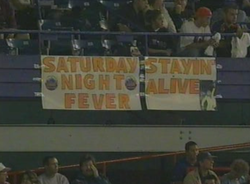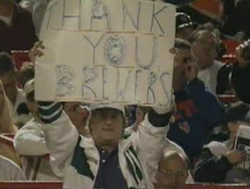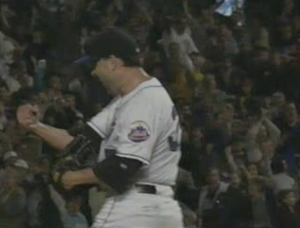Click here for an intro/manifesto on The 1999 Project.
October 2, 1999: Mets 7, Pirates 0
While the Mets prepared for the middle game of their series with the Pirates, art-lovers and curious souls lined up at the Brooklyn Museum to get their first view of “The Holy Virgin Mary”, a controversial mixed-media piece by Chris Ofili that had drawn the ire of Mayor Giuliani (Hizzoner’s main objection was that the mixed media included elephant dung). The debate over the artwork’s offensiveness (or lack thereof) had reached such a fevered pitch that it was now protected by a plexiglass shield and two guards.
Most people who actually bothered to go see the painting couldn’t fathom what the fuss was all about. Like Karen Masterson, who, despite being Catholic, didn’t find it offensive at all, and laughed at the small group of protestors handing out barf bags outside the museum. She availed herself of the free product anyway.
“We can use it later, when the Mets lose,” she said.
 Such was the attitude of many Mets fans, after a string of nine games that had all but destroyed their season. But an inspiring (if slim) win on Friday night, combined with losses by Houston and Cincinnati, brought them only one game out of the playoff picture. Despite all the wounds they suffered down the stretch, the Mets were knocking on the door of the postseason.
Such was the attitude of many Mets fans, after a string of nine games that had all but destroyed their season. But an inspiring (if slim) win on Friday night, combined with losses by Houston and Cincinnati, brought them only one game out of the playoff picture. Despite all the wounds they suffered down the stretch, the Mets were knocking on the door of the postseason.
Before the game on Friday, there seemed to be no hope whatsoever. Now, writers like Jack Curry of The New York Times wondered if everything was breaking their way after all.
How stunning would it be if the Mets wriggled into the post-season after the mess they caused by losing eight of their last nine? Almost as stunning as mishandling the four-game bulge they had in the wild-card race on Sept. 21. If the Mets win the wild card, they can laugh about the last two weeks. But those chuckles are at least 48 long hours away….
Before [Friday’s] victory, Piazza sheepishly mentioned that the Mets were not mathematically eliminated yet, and their chances improved last night. Someone reminded Piazza that the Mets could erase their pain with a memorable weekend and he mused, ”If the planets are lined up the right way, I guess that could happen.” Last night, they were perfectly aligned for the Mets. Finally.
The team’s fortunes had careened in so many directions in so little time that Rafael Hermoso of the Daily News provided a brief timeline of events of the last week, just so readers could keep track.
Before the game, Bobby Valentine announced that Orel Hershiser would pitch the last game against the Pirates on Sunday. He considered using Al Leiter on three days’ rest, but said, “When we went to a six-man rotation a month ago, [Leiter’s] comment was ‘I always like the extra rest. Those things coupled with the non-necessity we have a very good option who is very well rested in Orel I didn’t see any reason to experiment.”
Valentine neglected to mention the reason Hershiser would be well-rested: he only threw 24 pitches in his last start, recorded only one out, and gave up four runs in the shortest start of his career. So it was a gamble to go with the 40-year-old veteran in the last game of the season. Then again, throwing Leiter on short rest would be a gamble as well. And if Leiter didn’t pitch in the season finale, that would allow him to start for the Mets in the first game of the division series or a wild card playoff game.
The choice of pitcher for Sunday wouldn’t matter much unless the Mets got a good outing from their pitcher on Saturday: Rick Reed. After earning himself a trip to the All Star Game in 1998, he’d battled injury and ineffectiveness throughout the 1999 season.
But he’d also come up through the Pittsburgh organization, and the Pirates had all but given up on him. So perhaps he’d have some extra motivation to defeat the team that had tossed him to the curb. And when the Mets faltered at the end of 1998, he held himself responsible for going winless in September and losing a tight game to the Braves in the last series of the year. This game gave him a rare chance for both revenge and redemption.
 Also weighing on Reed’s mind: some welcome news. Before the Mets took the field, the game in Milwaukee had already gone final: the lowly Brewers had defeated the formerly red-hot Reds yet again. Cincinnati fell victim to a seven-run third inning, fielding errors, and a sudden inability to capitalize on men in scoring position. Meanwhile, in Houston, the Astros beat the Dodgers, 3-0, to take sole possession of first place in the NL Central. If the Mets could win this game, they’d be tied with the Reds for the wild card lead.
Also weighing on Reed’s mind: some welcome news. Before the Mets took the field, the game in Milwaukee had already gone final: the lowly Brewers had defeated the formerly red-hot Reds yet again. Cincinnati fell victim to a seven-run third inning, fielding errors, and a sudden inability to capitalize on men in scoring position. Meanwhile, in Houston, the Astros beat the Dodgers, 3-0, to take sole possession of first place in the NL Central. If the Mets could win this game, they’d be tied with the Reds for the wild card lead.
“You get hot, then you’re not,” Valentine said before the game, explaining the hopefully bygone woes of the Mets and the emerging woes of the Reds. “It’s more the way the game is than what people put on you….The Reds have been really hot, now it’s time to be cold.”
Before taking the mound, the prospect of pulling even with Cincinnati didn’t inspire Reed so much as terrify him. “After I saw the Reds lose, I’m not going to lie to you, I started pacing,” Reed confessed to reporters later. “I went from one room to the training room, weight room. I went everywhere. There were some guys in here that said, ‘Relax. Take it easy. Don’t worry about it’.”
If he was still nervous when toed the rubber, he didn’t show it. He struck out a career-high 12 batters, gave up only three hits and zero walks, and went the distance in a complete game shutout. He gave up a one-out double to Abraham Nunez in the top of the first, then set down eight Pirates in a row. When Nunez broke up this streak with a leadoff single in the top of the fourth, Reed responded by retiring the next 15 batters to face him.
Pirates batters protested some of the called strikes from home plate umpire Jeff Nelson; seven of their strikouts came looking. But even allowing for favorable calls, there was no denying this: Rick Reed threw the game of his life.
He needed to, because once again, the Mets’ bats were slow to get started. They loaded the bases with one out in the bottom of the third, but couldn’t push a run across. That was as close as they’d come to scoring against Pirates starter Francisco Cordova for the first five innings.
When they did finally break through in the sixth, it required assistance from some Pittsburgh blunders. John Olerud walked to lead off the inning, then Piazza reached on an error by rookie third baseman Aramis Ramirez. Robin Ventura followed with an RBI double to finally put the Mets on the board. One out later, after the Mets loaded the bases on an intentional walk to Roger Cedeno, Piazza scored on an error by first baseman Adrian Brown.
A 2-0 lead was all Reed needed, but the Mets tacked on in the eighth for good measure, with help from their starter. Cedeno singled and Rey Ordonez doubled to start the inning. Valentine initially sent Matt Franco out to the on deck circle to bat for Reed, but when the first two men reached base, he let Reed bat for himself. He responded by slapping a single into left field, scoring Cedeno and Ordonez and doubling the Mets’ lead. Reed eventually scored on an Olerud single, and Piazza followed with his 40th home run of the season (one shy of the single season mark for catchers, held by Todd Hundley).
 In the ninth, Reed gave up a single to Adrian Brown, the first baserunner he’d allowed since the fourth inning. But Brown was quickly erased on a groundball double play, and he struck out Nunez looking to end the game. The usually reserved Reed pumped his fist. The 1999 highlights video also catches him mouthing “fuck yeah!” (the video’s compilers obviously could not read lips as well as I can).
In the ninth, Reed gave up a single to Adrian Brown, the first baserunner he’d allowed since the fourth inning. But Brown was quickly erased on a groundball double play, and he struck out Nunez looking to end the game. The usually reserved Reed pumped his fist. The 1999 highlights video also catches him mouthing “fuck yeah!” (the video’s compilers obviously could not read lips as well as I can).
“He always talks about how not to show emotion and I said, ‘That’s B.S.,'” Al Leiter said after the game. “He showed emotion tonight and it says a lot of what it means to him internally.”
After all the strife, the second guessing, and the sand kicked in their face by the Braves, not only were the Mets’ postseason hopes alive, but they once again controlled their own fate. If they could win on Sunday, they would play again in 1999, no matter what Cincinnati or Houston did. A victory meant they would win the wild card, or play the Reds in a one-game playoff.
Valentine had a zen assessment of the Mets’ waxing and waning fortunes. “I’ve seen the game as a manager for about 1,800 games now. When things don’t go your way continually for a period, they do go your way continually for a period.”